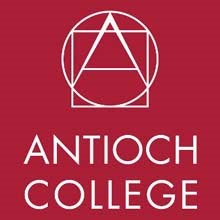by Chris Till
On
March 16, 1969, the legendary Abbie Hoffman visited Yellow Springs. At 8:30 pm on
that Saturday night, he spoke at 113 McGregor Hall on the Antioch College
campus. According to Hoffman’s FBI files, only 30 to 35 students attended.
This
relatively small turnout is notable because it was exactly four days before
Abbie became world famous. Why? Because on March 20, 1969, the Chicago Eight
were born. On that date, he and seven others were indicted for their alleged
conspiracy to foment riots at the August 1968 National Democratic Party Convention
in Chicago. After that indictment made him a star, Abbie became a popular and
controversial speaker at college campuses across America, performing to audiences vastly
larger than a few dozen.
In
his 1969 book Woodstock Nation, Abbie colorfully described his visit to
Yellow Springs:
"Antioch is Hippie Heaven.
It's our version of R & R (rest and recreation for you who weren't in the army)…
"It didn't take long to figure
out where Antioch's
head was at. There are lots of progressive nursery
schools, but there the kiddies are so big! Most issues that are being fought for at
other schools were won at Antioch
ten years ago. Perhaps won is not the right word,
they were liberally given. Like the big sheet of paper over the men's pissing
stall for graffiti. But, well Antioch
would be the dream school for most students
given what they now have. No ROTC, close teacher-student community
relations, people turn on and fuck everywhere, naked swim-ins in the gym pool, a black
dorm, nice woods, co-ed dorms, Sunday tourists who drive through to stare at the
commie-hippies, and so much love and identity-searching. It was all "Who
am I?" stuff. Everything was so beautiful, I was completely bored after three
hours. The school lacked the energy that comes from struggle. When I was
leaving the next day [my Antioch
guide] remarked, "You know surveys show that
55 per cent of us end up in large corporations." What Hair is to Broadway, Antioch is to
universities. That's not really a put-down. If you can't fuck you might as
well jerk off. Antioch
is the best play going, that is, if you've got about $25,000 for
an orchestra seat."
Whether
Abbie’s commentary is insightful or insulting or both, I will leave to those of
us who may have been in Yellow Springs in 1969.
From
Abbie's FBI files, regarding that March 1969 Antioch appearance: Hoffman
"attacked 'the establishment' and called for everyone 'to do their thing,'
meaning to behave as they individually wished … [T]he subject was not paid a
fee by the college but was given some money taken up as a collection from among
the students who were interested in giving to that purpose… [The FBI informant]
was not familiar with the amount of money the subject might have received nor
would there be any record of it anywhere at the college."
“Who
was Abbie Hoffman?” younger readers may ask.
Abbie
was the author of about ten books, ostensibly about politics. Yet, he may be
better understood as a humorist, rather than as a serious commentator. He was a
terrifically irresponsible man. A master of self-publicity. Media darling. Media
demon. An acid eater. Womanizer. Charmer. Liar. Shoplifter. Co-founder of the
Youth International Party, aka the Yippies. One of the leaders of the protests
at the 1967 Levitation and Exorcism of the Pentagon and 1968 Chicago Democratic
Party Convention. One of the Chicago Eight (later the Chicago Seven) in the
massively publicized Chicago Conspiracy trial of 1969-1970. Would-be hero of
the Second American Revolution. Cocaine dealer. Felon. Fugitive. And finally, dead
by suicide at age 52 in 1989.
His
two thrown-together books from 1968 and 1969, Revolution for the Hell of It!
and Woodstock Nation really capture the era's rebellious psychedelia. For
some, it was an era full of revolutionary pretense: the world was about to
change, the Age of Aquarius had dawned, the revolution was at hand! As director
John Waters wrote, it was "a
decade which may never be surpassed in misguided revolutionary lunacy." Abbie
aspired to be a general in that flower power army, but, even more than that, Abbie
just aspired to be famous.
Looking
back, Abbie's suicide in 1989 is especially unfortunate because, regardless of
his character flaws, he would have really enjoyed the fall of the Soviet Union's tyranny soon after his death. For those
curious about Abbie, the classic book on his life is Larry Sloman's 1998 oral
biography, Steal This Dream: Abbie Hoffman and the Countercultural Revolution
in America.
If
any readers attended that Abbie’s McGregor Hall lecture in 1969, I would love
to hear their memories.
Reader submissions are always welcome.
Reader submissions are always welcome.








No comments:
Post a Comment